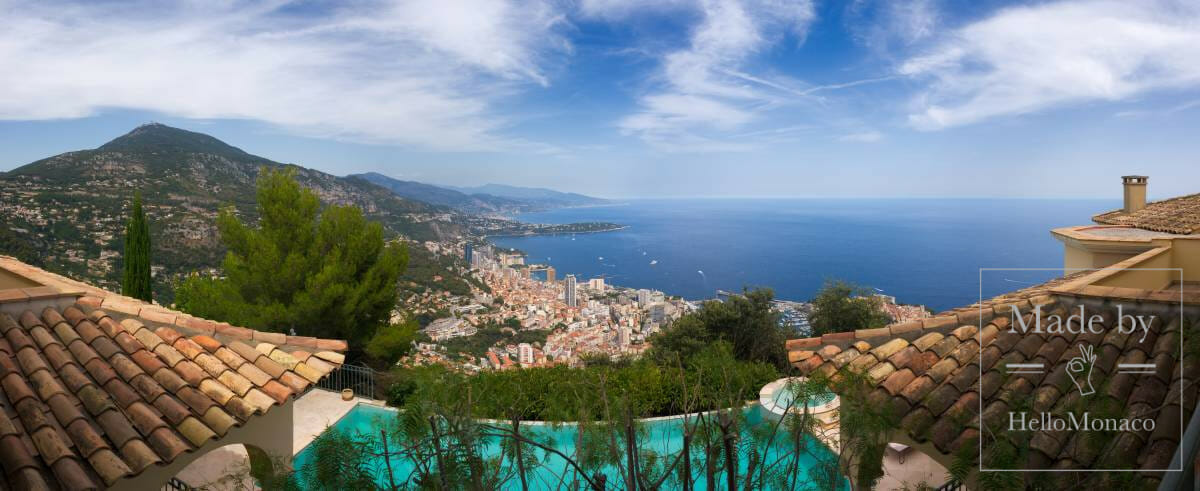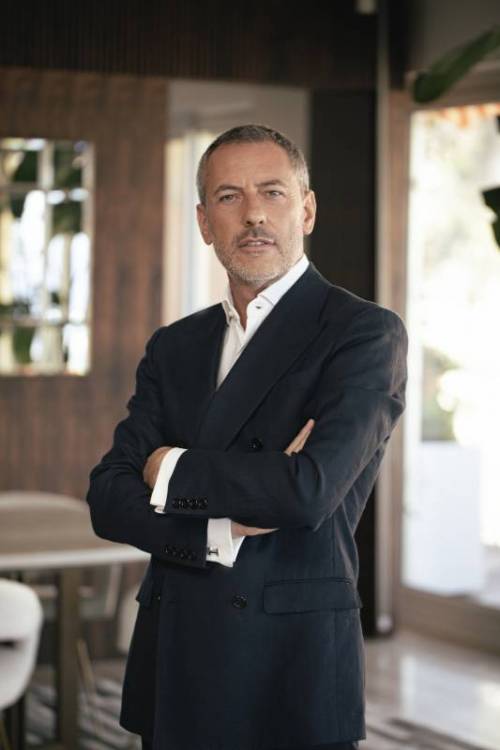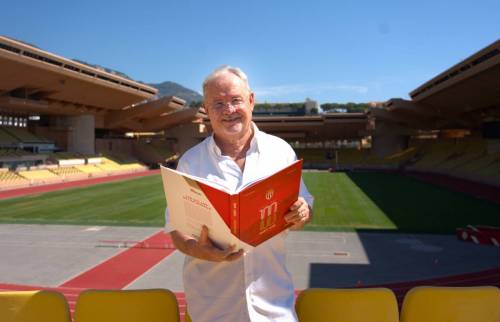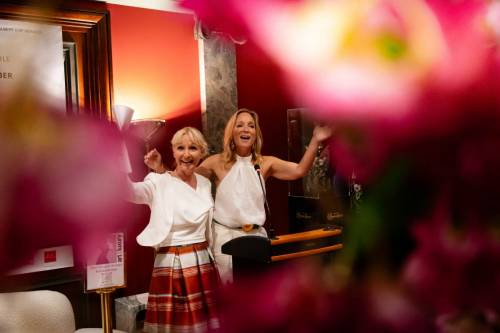The Principality of Monaco is home to many well-known artists and collectors. This year the second edition of the Artmontecarlo exhibition attracted many famous galleries and collectors from all over the world. Chief editor of HelloMonaco Olga Taran was happy to meet for an interview the world’s biggest collector David Nahmad during that event.
David Nahmad was born in 1947 in Beirut, Lebanon. His father, Hillel Nahmad, was a banker in Lebanon. In 1960, Hillel Nahmad moved the family from Lebanon to Milan in Italy. There, at that time, little boy David had his first taste of art. David together with his two brothers Joseph and Ezra started early careers in art dealing during the mid-1960s. Already at school age, the boys were trading in the Italian Stock Market. In the 1970s, the terror of Red Brigades forced the family to move again. David moved to New York while his two brothers settled in Monaco where he joined them later.
Even though the brothers settled in different countries, David and Ezra went on to establish their business together. Throughout their careers, they have built an enormous collection of modernist and impressionist art. All these pieces of art are stored in
a duty-free warehouse in Geneva. Meeting once with Daniel Henry and becoming friends with him, helped David to purchase the largest number of paintings of Picasso. David’s collection can boast of over 300 paintings of Picasso exceeding a value of $1 billion.
Eventually, the brothers made their huge fortune by buying and auctioning the paintings. David’s career is highlighted by his choice to become an art dealer instead
of choosing the conventional commercial businesses options. A huge collection of Picasso paintings and lending his collection for numerous exhibitions added uniqueness to his career profile. David is married and has three children. David’s son Hillel, known as Helly, runs the Helly Nahmad Gallery in the Carlyle Hotel in Manhattan. David personally likes paintings having a historical connection.
A megadealer who together with his brother owns a huge stockpile of modern and impressionist art from Monet and Matisse to Renoir and Rothko, kindly agreed to share with HelloMonaco his feeling about Monaco, the world of art and gave advice on how anyone may become a collector.
HM: What could you say about the future of contemporary art?
DN: I more specialize in modern and classic contemporary art. Today there are too many artists and it is getting difficult to choose. Prices in contemporary art in my opinion are too high and the artists are too young, and everybody wants to be at the level of Picasso, Matisse, Cezanne. It is impossible. You need time to demonstrate to the world who you are. It is not by lifting the prices up, that you become famous.

HM: How did you become a great collector?
DN: I started this business when very few people were involved in it. At that time I used to go to the auctions where the room was empty, there were maybe 25 pieces and that’s it, it was in mid-60’s. The catalogues were very thin, not so much colors, because mostly they were produced in black and white as it was very expensive to print it in colors.
Also, my older brother was a very important collector and my parents were bankers. I was born in Lebanon and then we moved to Italy. My brother was friends with many artists such as Fontana, Salvador Dali, Bury, Max Hesse etc. I was 12-13 years old when I started to look at art like something special. I used to read a lot of books about history of art. I was also amazed by some images. One day I was reading a book about Modigliani and I saw a picture of some painting and I exclaimed: “This is such a wonderful painting!”, and 3 years later I bought that painting. Could you imagine?
That’s unbelievable. I believe in destiny.
HM: What does art mean for you personally?
DN: The most important is the history of art. There is a lot of art as decoration, and we don’t have to consider art as decoration. Art is about development, testimony of our
civilization.
HM:Can you tell us how many pieces of art do you have in your collection? And do you have a favorite one?
DN: For the real collector, the most important is not the number/price, but the quality. I think people confuse a quantity and a quality. I love Picasso, Kandinskiy… I am in love with intelligence. I am against recollection and for intelligence. I like to play bagammon and I was a champion in 1996, I like games and art where you have to use your brains.
HM: Art is your true passion in life?
DN: My first passions in life are science and mathematics. When other collectors explained to me a lot of things about the art, I discovered art is a big science. Therefore, I started to like art. And when you like something you must go inside the thing, you just cannot avoid it. It is important being authentic with your time. It means that you don’t copy other artists. Most probably, if it is a copy, there is no substance,
it is empty.

HM: Did you come across a lot of copies in your life?
DN: There were so many copies. Today everybody copies another artist. Most people don’t know that it is a copy because they don’t know this artist. Most buyers don’t have any idea about the history of art. So, they buy something that has being done by somebody else.
HM: How does one become an art collector?
DN: Before buying paintings, they should buy art books and read the history of art. You
have to go to the library and study for three years and then you start to buy art. There is
no special recommendation, just any book about the history of art. They all talk about
approximately the same. You can’t change the base. If Kandinsky created abstraction in 1911, you cannot say he did it in 1920. If he left Russia to go to Germany in 1921 and then he went in France, because in Germany Hitler has come to power and many artists left the Germany and before Second World War they went to the USA, those are facts. You can’t change it, it is a history.
HM: You know so much about art, would you like to write your own book one day?
DN: I am on it. I have a lot of stories that are not written anywhere and I want them to be read. I met old art dealers and artists, most of them are dead. But when I met them they told me a lot of stories in the beginning of the century that are not written in any books. For example, a story about two famous Russian art collectors Morozov and Shchukin, when they used to go to the French Riviera to Henry Matisse’s house. They were the most important clients of Matisse at that time and son of Matisse later used to tell me the real stories how they used arrive, how they used to negotiate etc. These are things that you cannot read anywhere. It is a transmission, somebody told me and I share what he or she told me. For example, Fontana was a friend of my brother so he used to come to our house with also other artists and art dealers.

HM: Do you know HSH Prince Albert II personally?
DN: I met him in 2013 concerning my big exhibition of Picasso. And I know for sure that Prince Albert II is very involved in the art and promotion of Monaco through it. He
understands that a country without art can’t be an important center.
HM: Have you ever organized your own exhibitions in Russia?
DN: I’ve a very beautiful show in Moscow at the Tretyakov Museum. It is about Giorgio de Chirico, famous Italian surrealist and it has been opened at the end of April.
HM:How did you like Moscow?
DN: It was my first trip and I liked it very much. I think that people there experience
an education very similar to my own, because I am oriental. Russians are very kind
and generous. I was invited by the honors by the owners of the Mercury Group which
owns the Philips auction house.
HM: And what about Monaco?
DN: I came first time to Monaco when I was very respectful, I feel very good. I came to live definitely here in the beginning of the 80th. Life here is wonderful, I love France and Italy, and Monaco is a nice combination of two to live here.
HM: Do you think that Monaco has changed a lot lately?
DN: No, I don’t think so. I think Prince Albert II just give it a touch of modernization. There is a lot of construction, you can feel that the country is in development.
HM: What special places can you recommend in Monaco?
DN: I like the Maya Bay it is my favorite place in the world, it is Japanese cuisine there. I
like to go to the places where you are well received. It is very important the reception,
when you feel that you are liked. I prefer authentic places. I don’t like sophisticated
food, I am simple person. I like spaghetti, I like Lebanese food. In Moscow I also was
invited to the Mario restaurant which is a very nice place.
Photos@News/McClatchy DC








